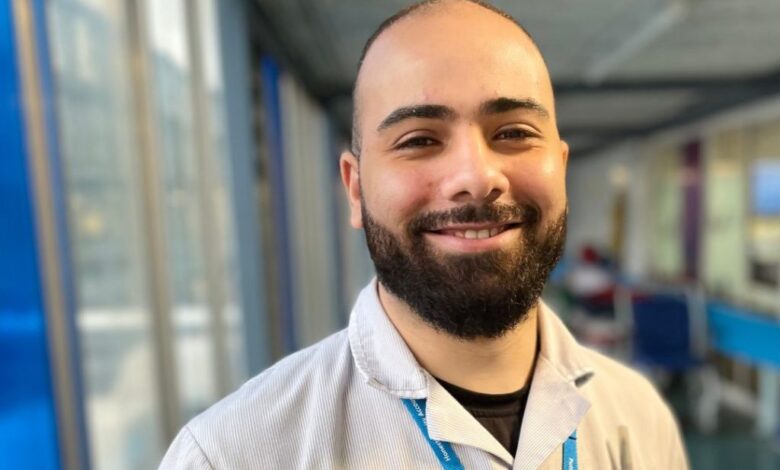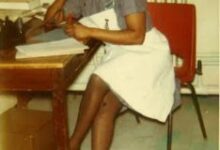Refugee nurse joins London trust under fast-track visa scheme

A Palestinian nurse from Lebanon has said a refugee recruitment scheme has allowed him to get a better quality of life in the UK.
The Talented Beyond Boundaries scheme allows displaced people and those with refugee status who are qualified as nurses in their home country to be fast-tracked onto a skilled worker visa.
The visa scheme, which is run in collaboration with NHS England, means they can work as a healthcare assistant while they work to qualify as a band 5 nurse here.
“[Lebanon] is a troubled country, it is in an economic crisis, and [living and working there] was very hard and very tiring”
Tarek Kaddoura
Tarek Kaddoura, a 25-year-old Palestinian from Lebanon, previously trained, qualified and worked as a nurse in Beirut.
However, through the programme, he was recently recruited as a skilled worker by London North West University Healthcare NHS Trust, along with three other refugees.
Like most Palestinians in Lebanon, Mr Kaddoura had refugee status, although he lived there for many years, and would never be granted citizenship due to the country’s rules for people of his nationality.
Mr Kaddoura said that, while Lebanon would “always” be his home, he felt there was “no future there” for him and opted to apply to join the UK nursing workforce.
He subsequently worked for three years as an emergency nurse in Beirut before joining London North West last year.
In his relatively short time in the Lebanese health sector, he worked during Covid-19, civil unrest and was present in the city during the 2020 Beirut explosion, which killed 218 and injured thousands more.
“[Lebanon] is a troubled country, it is in an economic crisis, and [living and working there] was very hard and very tiring,” he told Nursing Times.
“During Covid, we were overwhelmed; it took half the staff off, and when we’d usually have 15 duties, for example, we would do 23,” said Mr Kaddoura.
“It was awful, and at the same time you felt you couldn’t refuse to do something during Covid,” he said. “If you didn’t come in, no one could care for the patients.”
He said that, as well as the stress during the Covid-19 pandemic, which nurses across the world experienced, in Lebanon, there was a sense the workforce was being undervalued.
“A lot of [nurses] were not being paid enough,” said Mr Kaddoura.
“I tried to stay and find a way, because there were always promises things would improve in time – they did, but not enough and after three years I thought I don’t have to wait anymore.”
It was at this point Mr Kaddoura applied for the scheme, and was accepted by London North West.
Mr Kaddoura then successfully completed an English language exam before working towards his OSCEs to qualify.
At the time of writing, Mr Kaddoura is around a month away from his final exams before being a UK-registered nurse. In the meantime, he has worked as a healthcare support worker.
He said the scheme has been “supportive” of his wellbeing needs, but that it has been “hard” to start from scratch. “I’m already a nurse, and have the capabilities. I didn’t want to wait,” he noted.
“It’s very hard to start over, but I am in touch with a few people who used to work with me in Beirut and who have [come to the UK] on the same scheme.
“I am so grateful to be here and luckily have a group of friends living in Kenton who followed the same path as me several years ago. I always wanted to come to the UK, but I do miss my family and the food.”
Cindy Marudamuthu, lead nurse for operational standards at London North West and the lead on international nursing recruitment, explained that extra measures were put in to ensure a smooth transition for the displaced people who join the trust as skilled workers.
“We have occupational therapy and a consultant involved, so that they’re involved, confidentially, of any difficulties [the nurses] face,” she said.
“All managers who work with them come in for extra training and briefings, and we assign each recruit with a practice educator,” she noted.
The nature of recruiting refugees and displaced people, Ms Marudamuthu continued, means these measures are necessary.
“We had an external trainer to explain what might trigger someone who is going through PTSD,” she continued.
“It could be things like loud noises, or things we can’t think of. And how they might deal with death on the ward might be different to how we do.”
Despite these challenges, Ms Marudamuthu said the four nurses recruited to her trust have all settled in well.
“They all have expertise they’ll bring in once they qualify. It’s definitely more complex than regular international nursing recruitment.
“But most of them have previously worked in areas like emergency departments and the experience they have is vastly different,” she added.







